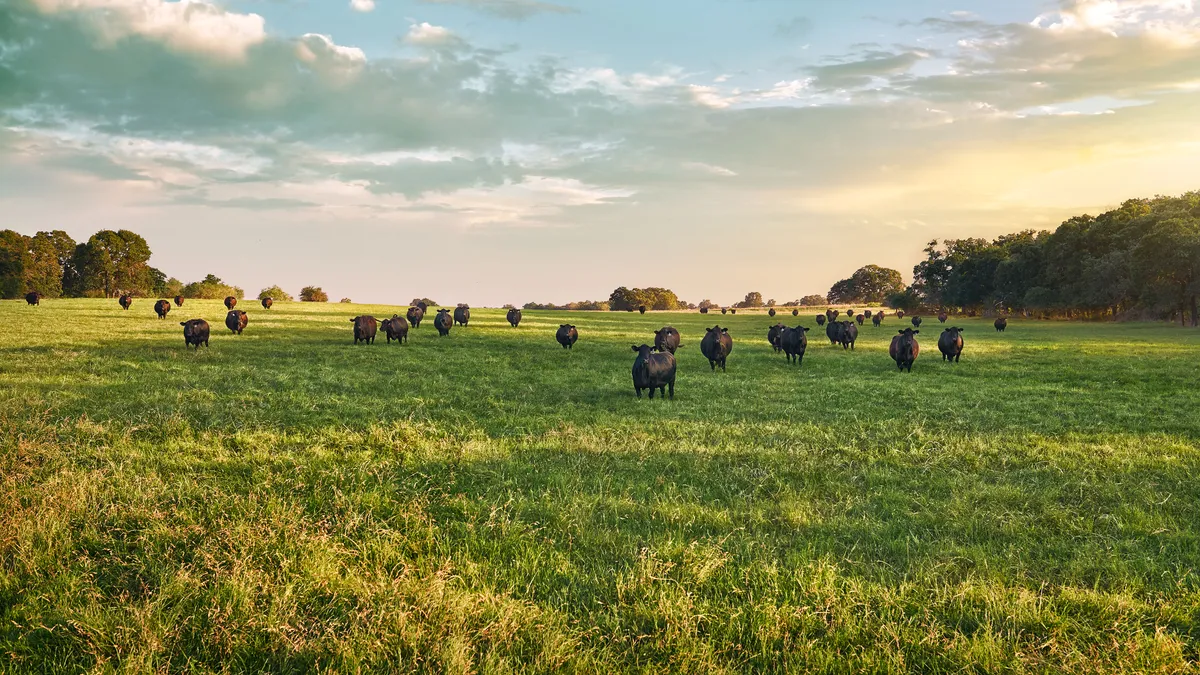Dive Brief:
- Walmart is launching its own end-to-end supply chain for Angus beef, the company announced today. The move is intended to meet customer demand for added transparency and improved food quality and freshness, according to the announcement.
- Five hundred Walmart stores across the southeastern U.S., including Alabama, Georgia and Florida, will carry Angus beef cuts such as steaks and roasts from the new supply chain.
- Walmart will work with partners including Bob McClaren of Prime Pursuits, which operates 44 Farms and is the largest beef producer of black Angus in Texas. The program, which took just over two years to put together, according to Bloomberg, will create more than 250 jobs at a beef processing facility in Kansas and 200 jobs at a packing facility in Georgia.
Dive Insight:
According to a blog post from Scott Neal, Walmart’s senior vice president of meat, Walmart is on a mission to make "the beef America eats better." Neal said customers want freshness and affordability, but they also want to know where their food comes from. Walmart will source beef from cattle raised on family farms and ranches and will aim to change the dynamics of the beef industry, Neal wrote.
The measure will also save Walmart money by cutting other companies out of the supply chain. It's a step large retailers, with their logistical expertise and major investments in private brands, are uniquely suited to handle. Costco has gone down this same path recently, establishing its own poultry operation in Nebraska to support its $5 rotisserie chicken business. Kroger, Albertsons and other retailers have also started supplying their own milk, cutting into the profits of major manufacturers like Dean Foods.
Walmart currently partners with Tyson Foods and Cargill to supply much of its beef, and will continue to source most of its products from them, Bloomberg reported.
Angus beef is having a moment right now, with fast food restaurants like McDonald's and Burger King incorporating the protein into their menus. The premium-meets-affordability image has boosted industry sales to new heights. According to data from Certified Angus Beef LLC cited by Bloomberg, Angus beef sales volumes hit a record 1.21 billion pounds during the most recent fiscal year.
Meanwhile, Walmart continues to hold its place as the nation’s largest grocery seller as more shoppers turn to the retail giant for their weekly food hauls, especially with the retailer's expanding e-commerce offering in grocery. This year, the retailer will expand grocery pickup from 2,000 to 3,000 stores and will double the number that offer grocery delivery.
A steady supply of meat is key, particularly for Walmart’s online grocery efforts. Grocery pickup and delivery often result in substitutions for shoppers when stores are short on items, and with its own supply chain in place, Walmart may be able to better gauge demand and stock beef products for shoppers.
Grocers across the U.S. are recognizing the need for transparency and sustainable sourcing, particularly with meat and seafood. Whole Foods has long had meat standards in place for transparency and quality, and Publix’s new GreenWise banner is carrying meat without added antibiotics or hormones as well as house-made sausages. H-E-B and BJ’s Wholesale Club both recently announced initiatives to source sustainable seafood.
Walmart continues to showcase its commitment to grocery with this latest move. The company recently detailed multi-million dollar upgrades to stores across the U.S. with an emphasis on grocery, and has said that grocery is one of the company's biggest growth categories. Earlier this month, Walmart also launched voice-activated grocery shopping to support its e-commerce business.













